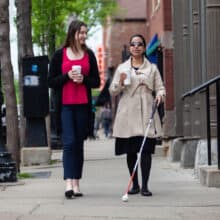What U.S. Airports Are Most Accommodating to People Who Are Blind or Visually Impaired?
March 20, 2015
Like everyone else, people who are blind or visually impaired have different preferences and experiences. Therefore, there is no simple answer to this question. After speaking with several individuals with varying visual impairments – and considering my personal experiences – I realized it would be hard for any of us to come up with a final verdict.
Many accommodations can be helpful to passengers who are blind or visually impaired. These include:
- Escort assistance from airline personnel to and from gates, ticketing counters, baggage claim, etc.
- Braille and large print signs
- Audio announcements about flight information
- Service animal relief areas
Not everyone requires all of this assistance. For example, the relief area for service animals would be useless to someone who uses a white cane, while large print signs would be of no help to someone who is totally blind, but very useful for someone with low vision. Some travelers prefer not to use some or all of this assistance, and that is perfectly okay. Depending on a person’s experience and comfort level he or she will decide how much – if any – assistance is needed.
Jim Kesteloot, former Chicago Lighthouse executive director, is a frequent flier and is particularly familiar with Chicago O’Hare International Airport, the world’s busiest in terms of operations. Since he has traveled throughout the United States for many years, Jim does not seek assistance from airlines. Instead he prefers to utilize some of the other accommodations available to passengers with disabilities. One of the things he likes about Terminal 3 at O’Hare is that the gate numbers are in large print and have a visual contrast that is easy to distinguish. He also relies on audible flight information and can hear the announcements in that particular terminal with no problems.
Sammi Grant is the volunteer coordinator at The Chicago Lighthouse. When she travels alone she requests assistance from airline personnel to escort her to the desired location in the airport. She has found that while this accommodation is very helpful, the service depends mainly on the airline staff and their awareness of the needs of people who are blind or visually impaired. Sammi feels that an airport’s accessibility features would not be a deciding factor for her when planning a trip.
Another factor that is important but not considered an accommodation specific for people with disabilities is the distance between different terminals in an airport. Bill Jurek, the director of the Chicagoland Radio Information Service (CRIS) at The Chicago Lighthouse, also travels frequently to and from O’Hare Airport. One of the things he particularly likes about O’Hare is that the terminals and gates are connected. In other words he does not have to take a train or shuttle from the terminal in order to get to the gate to catch his plane.
Like Sammi, Bill requests assistance from the airline. He uses a dog guide and often requests bulkhead seating in airplanes. Bill says that airline staff will often “go out of their way” to accommodate his needs.
As a person who is totally blind, I also request assistance when flying by myself. This is very helpful given that I am not a frequent flyer and therefore I have not had the chance to familiarize myself with specific airports. I too have found that generally airline and TSA staff are very accommodating.
These different experiences show us that it would be virtually impossible to pick airports that are the most accommodating to people who are blind or visually impaired. Many factors influence the travel experience in airports and elsewhere. There is also no right or wrong answer when seeking accommodations or assistance. Always consider your needs and preferences and, if possible, do research to familiarize yourself beforehand with the airports you will be traveling to.
We welcome feedback from any air travelers who are blind or visually impaired. Enjoy your trip!





